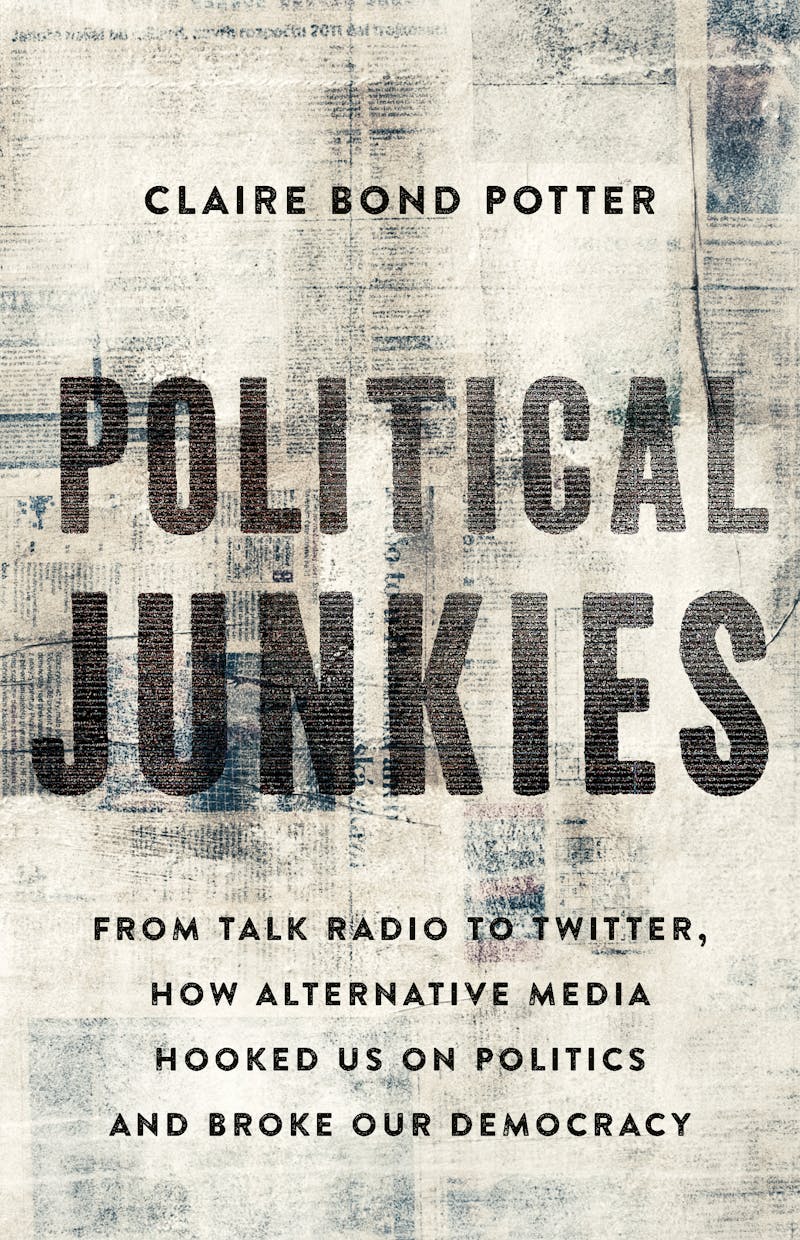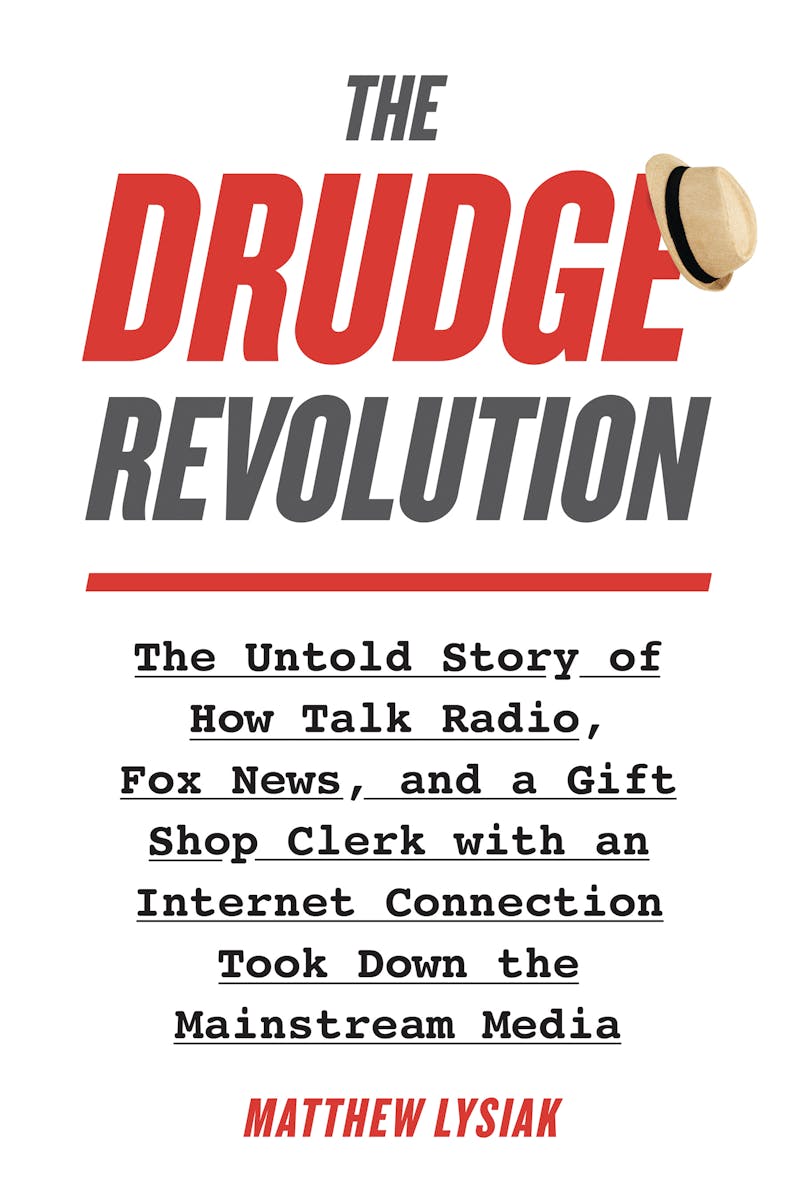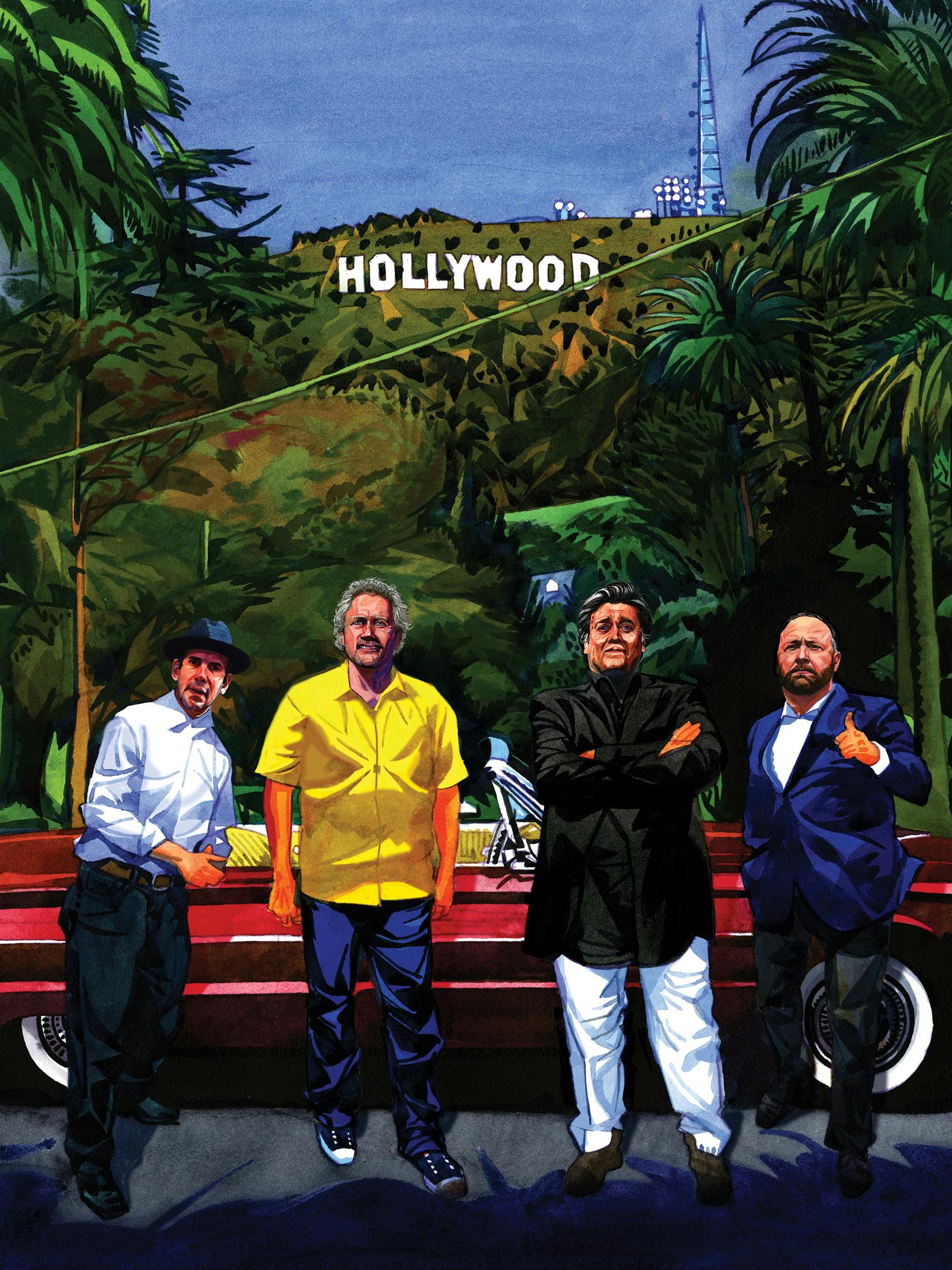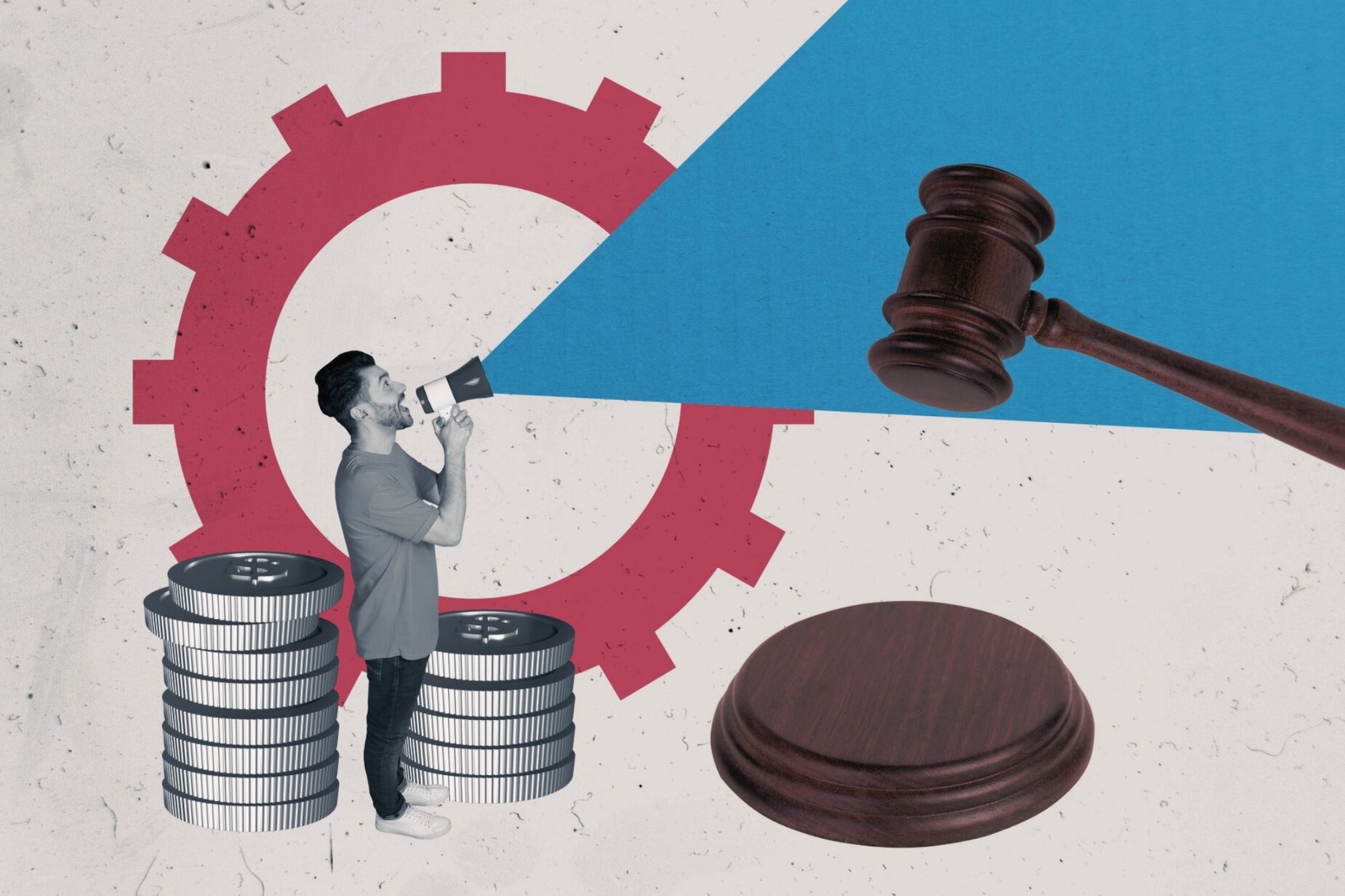There is an hour on the west side of Los Angeles, before the evening traffic slows to a crawl, when the falling light turns thin and clean. But young Andrew Breitbart often had to drive all day. After barely graduating from Tulane, Andrew had gotten hired as a runner at a low-budget production company in Santa Monica through a friend, and now he was being paid $230 a week to carry scripts from his boss to other bosses all over town. Within a year, he had put 22,000 miles on his Saab convertible, and started to hate the world he was still desperate to break into, the sycophancy and cliquishness of Hollywood, the people at parties always glancing over his shoulder for someone more important.

Political Junkies: From Talk Radio to Twitter, How Alternative Media Hooked Us on Politics and Broke Our Democracy
by Claire Bond Potter
Basic Books, 368 pp., $32.00
The saving grace of the gig was that it gave him time to listen to AM radio. Not long after graduation, his girlfriend’s father, the actor Orson Bean, had turned him on to Rush Limbaugh. Andrew had felt skeptical at first—he was still a Democrat, and he’d heard Democrats call Limbaugh a Nazi—but soon found himself hooked. In his gravelly solemnities and arpeggios of anger, the shock jock seemed to speak directly to you; he told you why you felt the way you did. Limbaugh painted a picture of the world that Breitbart and everyone he knew inhabited but that he could only now see clearly: the Democrat-Media Complex. Breitbart could not get enough; he would keep listening on his radio cassette player, during the minutes it took him to walk from the parking lots where he left his Saab to the offices where he dropped off scripts, and back.

The Drudge Revolution: The Untold Story of How Talk Radio, Fox News, and a Gift Shop Clerk With an Internet Connection Took Down the Mainstream Media
by Matthew Lysiak
BenBella Books, 230 pp., $26.95
At least, this is the way Breitbart would later tell it, in a memoir that—as he also tells it—he had to write on an airplane because that was the only way he could get himself off-line long enough to focus. Breitbart may have been adopted and raised by a Jewish father, as he mentions early on. But his book Righteous Indignation follows the familiar pattern of the Christian conversion narrative. He was blind; then he saw. The LA freeways were his Road to Damascus.
The memoir’s release in 2011 was perhaps the last point at which Breitbart could have plausibly claimed to be any kind of outsider. By the time he died of heart failure at the age of 43 in 2012, he had adapted a version of Limbaugh’s rage and paranoia for mobile, and, in the years that followed, the network he had belonged to grew in influence. Matt Drudge and Arianna Huffington, with whom Breitbart worked early on, were both already famous. Jonah Peretti, who worked on launching The Huffington Post with Breitbart, went on to found BuzzFeed. Steve Bannon, who had worked on the financing of Breitbart.com and took over the website after Andrew Breitbart’s death, oversaw a relaunch funded by the Mercer family, and then left to serve as Donald Trump’s chief strategist. A surprising number of right-wing Trump-era provocateurs, it turned out, came from or gathered in supposedly liberal Los Angeles and its environs: Not just Drudge and Bannon but Stephen Miller, Dennis Prager, Mike Cernovich, Steve Sailer, and Peter Thiel; early Breitbart employees Ben Shapiro and Julia Hahn were Angelenos, too. It is easy to imagine them palling around and getting into petty spats like characters in a dark mirror version of Curb Your Enthusiasm.
Since Trump’s election, a spate of articles and books has begun explaining this world to people who had not been paying attention. Journalists on what the New Yorker writer Andrew Marantz has termed the “bad-guys-on-the-internet-beat” tend to make much of the role of social media platforms in creating and consolidating new right-wing movements. But the internet has offered openings, and meeting places, for a wide range of jerks and racist ideologues, for decades. As early as 1983, the Aryan Nations World Congress determined that it needed to start communicating, coordinating, and recruiting online; shortly thereafter, members of white supremacist militias began conducting armed robberies in order to finance a series of password-protected message boards called Liberty Net. In 1998, David Duke predicted that “the Internet will begin a chain reaction of racial enlightenment that will shake the world.” YouTube did not invent white supremacy, in other words, any more than Twitter invented trolling.
As Breitbart’s awe for Limbaugh demonstrates, today’s right-wing media did not come out of nowhere. Two new books promise to uncover its prehistory and the widespread sense that it has broken American reality. Claire Bond Potter’s Political Junkies tracks the rise of a broad swath of what she calls “alternative media”—both left and right—since the print newsletters of the 1950s, while Matthew Lysiak’s The Drudge Revolution focuses more narrowly on the story of Matt Drudge’s life and the influence of his early online aggregator, The Drudge Report. These are very different books: Potter, a professor at the New School, keeps a (mostly) neutral, academic distance from her subjects, while Lysiak has written a sympathetic biography that moves at the speed of a screenplay. But both illustrate that the descent into misinformation and fake news is not an aberration, but represents the culmination of decades of legal, technological, and economic changes, helped along by canny entrepreneurs who capitalized on them.
Potter does not define precisely what she means by “alternative media.” But the term really only makes sense in opposition to the “mainstream” or mass media that emerged in the first half of the twentieth century, in the form of national newspapers and magazines, Hollywood film studios, and radio and television stations. These outlets grew up with new standards for objective reporting and new federal agencies and laws that forbade broadcasters from engaging in open partisanship. In 1927, Congress passed the Radio Act, requiring broadcasters to give political candidates equal opportunities to present their views. In 1949, the expanded Federal Communications Commission (created partly in response to the popularity of the antisemitic radio star Father Coughlin) established the “Fairness Doctrine,” requiring broadcasters of all kinds to provide multiple points of view on controversial issues. As more Americans tuned in, a carefully regulated Cold War media pushed them toward what historian Arthur Schlesinger Jr. famously named “the vital center.”
The consolidation of a mainstream also almost immediately created dissidents and defectors. This was often no bad thing. Potter’s book opens in New York City in 1952, a moment when daily newspapers were rapidly losing advertising revenue to television. Izzy Stone was a veteran progressive journalist, who found himself at The Daily Compass, the last left-wing, subscriber-funded paper in the city, when it folded. He and his wife, Esther, took their savings and his $3,500 severance check, and launched their own four-page newsletter: I. F. Stone’s Weekly. Stone, whose impaired hearing and vision kept him from participating fully in press conferences, had long cultivated a reputation for getting stories from other sources—gleaning them from government documents, or stowing away on a ship with refugees in order to gather details about their conditions. In his newsletter, Stone developed a distinctive tone of voice, articulating a progressive critique of the U.S. government and the media that kept its secrets. He and Esther bet that subscriber support would give them independence, and it did; Stone never worked for an editor again. By 1960, most of New York’s dailies had gone out of business. But when I. F. Stone’s Weekly stopped publishing in 1971, it had 73,000 subscribers. Among them were young admirers who would remake American journalism as the Vietnam War broke apart the 1950s culture of consensus.
Seymour Hersh first encountered Stone’s work in 1964. At the time, Hersh was working at the Associated Press; by 1966, he and Stone had become friends. Hersh would later recall that Stone helped him recognize how the mainstream media marginalized journalists who dared to embarrass the government, and strengthened his conviction that the public had a right to information that both the media and government were trying to keep from them. In 1969, a military whistleblower contacted The Village Voice; the Voice passed the tip, about a massacre in a village in Vietnam that the Army was covering up, on to Hersh, who was then working as a freelancer in Washington, D.C. In 1970, he received the Pulitzer Prize for his coverage of My Lai.
The Voice was only one of dozens of publications staffed by young radicals during the 1960s—Dissent, The Nation, The Black Panther, the Berkeley Barb, Ramparts—and their critical energies circled back to influence the mainstream press. In 1971, after much internal debate, The New York Times published the Pentagon Papers. The tone on television was shifting, too. Potter follows Robert MacNeil, a young Canadian-born news anchor at NBC in the mid-1960s, who found himself increasingly disillusioned about the way the networks were turning the carnage in Vietnam into a sanitized “living room war” that families could watch over dinner. MacNeil left NBC to write The People Machine and freelance, until a few years later he joined PBS. In 1973, he convinced his friend Jim Lehrer to co-host gavel-to-gavel coverage of the Watergate hearings. Their real-time coverage and analysis was a huge success, tripling the membership of PBS affiliates.
Yet liberals were not the only ones trying to use new tools and techniques to build new publics. In the most interesting chapter of Political Junkies, Potter describes the rise of a class of conservative “political technicians” who came together around the Barry Goldwater campaign in 1964. Foremost among them was Richard Viguerie, who would coin the term “New Right” in 1973. Inspired by innovations in direct-mail advertising, in 1965, Viguerie founded a political direct marketing company, American Target Strategies. He built his original databases by hand. Federal law required that all donations to a presidential campaign over $50 be public, so Viguerie went to the office of the clerk of the House of Representatives to write down the name and address of every American who had donated to Goldwater. By the time they kicked him out, his fingers had gone numb, but he had transferred 12,000 entries onto magnetic reels of tape. This was the beginning of a project of building voter databases that Republicans eventually used to help get Ronald Reagan elected in 1980. And in many senses, Viguerie’s business model—which gave him co-ownership of the databases that he developed for any client—anticipated the methods of more recent technology companies like Facebook or Palantir.
There were important differences among the figures that Potter groups together as alternative media activists. Although they each saw themselves as creating alternatives to the major national newspapers, television, and radio networks, media entrepreneurs from the left were not taking aim at the notion that national media could be trustworthy. Figures like Stone, Hersh, and MacNeil shared the ideals of accuracy and truth-telling that The New York Times and the big three television networks professed. If they criticized mainstream journalism, they did so in the spirit of more fully achieving, rather than abandoning, its mission.
By contrast, conservative media activists were making a more radical claim: that journalistic objectivity itself was impossible, a delusion—or worse. They also brought considerable financial resources to the fight. Some drew on deep family fortunes to pay for their projects, while others benefited from the support of the major corporations that they defended against organized labor and government regulation. The end of the Cold War and the popularization of the internet would create opportunities for them to advance these claims and dramatically expand their audiences.
Matt Drudge did not believe in objectivity either. This is what he told David Sheff, in an interview that appeared in Playboy in June 1998. The online tip sheet that Drudge had been curating and publishing since 1995 became a household name in January of that year, when Drudge broke the story of Bill Clinton’s affair with Monica Lewinsky. More precisely, Drudge broke the story that Newsweek had killed the story the magazine’s reporter Mike Isikoff had been researching and fact-checking for months. “NEWSWEEK KILLS STORY ON WHITE HOUSE INTERN XXXXX BLOCKBUSTER REPORT: 23-YEAR-OLD, FORMER WHITE HOUSE INTERN, SEX RELATIONSHIP WITH PRESIDENT,” his headline read. Drudge had been posting a stream of negative headlines about the Clintons and their associates, even after Clinton aide Sidney Blumenthal sued him for defamation. Sheff asked Drudge whether this fixation did not damage his journalistic credibility. Drudge scoffed. “Since World War II, we’ve had an era in which journalism is supposed to be objective,” he told Sheff. “That’s crap. That’s a new phenomenon. The earlier press had nothing to do with objectivity. This whole objectivity thing is a fraud.”
Drudge was repeating a line that conservative media activists had used since the 1930s. In the 1960s, they attacked the FCC and the Fairness Doctrine in exactly these terms: Objectivity was a trick that Cold War liberals were using to keep their right-wing critics off the air. The practices associated with objective journalism simply served to police the boundaries that the establishment had set for discourse. But since then, a series of technological and legal changes had created conditions for overtly partisan media to flourish again. With the proliferation of radio frequencies and advent of cable television, there were vastly more broadcasting channels available, and fewer rules about what broadcasters could say on them. The FCC had abolished the Fairness Doctrine in 1987. Rush Limbaugh began broadcasting nationally just a year later; by 1994, he had 20 million weekly listeners. The end of the Fairness Doctrine also freed cable television from trying to carve out a broad, representative audience: Rather than attempt to replicate CNN, Fox and MSNBC—both launched as 24-hour channels in 1996—could pursue their strategies of appealing to segmented right-wing and liberal markets. The ground had been cleared for a new network of right-wing media makers to take shape, and break open the mainstream in a way that their predecessors from the 1930s to the ’60s never could.
If the multiplication of broadcast channels had allowed broadcast media to diversify, the advent of the web—the World Wide Web protocol that Tim Berners-Lee released in 1991, and the web browser window that Marc Andreessen and others launched in 1993—began to transform the internet into a mass medium, by making it easy for anybody to use. The 1996 Telecommunications Act, which cleared the way for massive mergers in older media, further established that “no provider or user of an interactive computer service shall be treated as the publisher or speaker of any information provided by another information content provider.” That is, websites would not be responsible for anything users posted on them; they were platforms, not publishers. The combination of technological and legislative change created an environment in which a new kind of muckraking could flourish.
Lysiak’s biography of Drudge casts him as a pivotal figure in this transformation. (Potter devotes a full chapter to him, and to his role in inspiring a new culture of political blogging, as well.) Drudge was “an internet guy, not a right-wing guy,” an acquaintance from the 1990s tells Lysiak. In one scene, the conspiracist Alex Jones asks Drudge if he identifies as a libertarian, which sends him into a rage. (“I can’t be controlled,” Drudge shouts. “I cannot be controlled!”) Drudge claimed he was not an ideologue. Or rather, his only ideology was radical openness—combined with an intense secrecy that he maintained about his own life. At present, although he owns a house in Arizona, it is unclear where he lives, and it has been over a decade since he has appeared in any public photograph.
Nonetheless, Lysiak has assembled enough information to patch together a story of how Drudge became Drudge. Born in 1966 to two liberal professionals in Takoma Park, Maryland, he had a lonely childhood. His father left and married another woman with two children of her own when Matt was six, and Matt rarely heard from him after. His mother herself suffered from a series of debilitating health problems that left her, a former lawyer, financially desperate; forced to sell her car and borrow money from relatives in order to make mortgage payments, she eventually found herself working in a convenience store. One of Matt’s friends from high school remembered him treating his mother with open contempt. He got abysmal grades. One day, a classmate taunted him for being gay—which he was, but not openly—and threw a rock in his face, leaving him in need of stitches. At 14, he was arrested for making prank phone calls; the juvenile court judge described him as “disturbed.” The only times he seems to have been happy were when he cut school and headed to Washington, D.C., to listen to punk rock and dance in gay clubs.
Drudge had always been a media fanatic. A latchkey kid, he was raised by television. “At night, he narrated his own personal radio shows into a tape recorder before falling asleep to the talk radio voices crackling through the AM stations on his transistor radio,” Lysiak reports. He worked as a newspaper delivery boy throughout high school, and often read newspapers and magazines in class. He never applied to college, and after a few shiftless years moving between Maryland and New York City, he ended up in a one-bedroom apartment in Hollywood, working, like Breitbart, in the lowest tier of the entertainment industry. As a runner on The Price Is Right, he earned $5 an hour. Fate struck when his estranged father paid him a rare visit in Los Angeles, and bought him a 486 Packard Bell for $1,500. Not long after, Drudge registered the domain name of Drudge Report, and, using simple web publishing tools, he started posting a tip sheet, in glaring Arial font. Rifling through the trash at CBS Studios for stories, he steadily built subscribers and attention, publishing scoops about celebrities that he had literally found in the garbage.
As Drudge’s reputation and his mailing list grew, he began to connect with the anti-Clinton right. At dinner parties in Washington, D.C., he befriended Tucker Carlson, Laura Ingraham, and the lawyer and Republican donor George Conway (now perhaps best known as Kellyanne Conway’s husband). This was why Lucianne Goldberg, Linda Tripp’s literary agent, thought to take the story of Monica Lewinsky to him after Newsweek killed it (or so she told Lysiak).
But Drudge wasn’t just a Republican partisan who happened to publish online. He also connected with a political crowd that is often treated as the opposite of right-wingers, but is closer to them than you might think: liberal and libertarian cyberutopians in Silicon Valley. Drudge got his first syndication deal with Wired, shortly after the magazine launched. He published there from 1996 to 1997, until leaving to accept a deal with AOL that paid him $3,000 a month, his first steady paycheck in years.
Potter devotes a chapter of Political Junkies to Silicon Valley visionaries who proclaimed that personal computing and digital networks were bringing about a new kind of radically participatory democracy—to Steve Jobs, the Whole Earth Catalog publisher Stewart Brand, and the futurologist (and teledildonics evangelist) Howard Rheingold. But she does not connect these ex-hippie liberals and libertarians to a figure like Drudge or, for that matter, Newt Gingrich, who appeared on the cover of Wired, the in-house magazine of 1990s cyberutopianism, in 1995. All of these figures shared an intense sense of opposition to established institutions. (“Governments of the Industrial World, you weary giants of flesh and steel…,” as John Perry Barlow famously admonished them in his “Declaration of the Independence of Cyberspace.” “You have no sovereignty where we gather.”) Drudge wanted to deregulate the marketplace of ideas, too. Like other disruptors, he insisted that if only everything could be said online, the truth would win.
In 1998, Drudge was invited, over some controversy, to give a speech at the National Press Club in Washington, D.C. (He brought Ann Coulter as his date.) Fidgeting with the fedora that, by then, he always wore in public, he described his vision. “There is a hunger for unedited information, absent corporate considerations,” he said.
The difference between the internet, television and radio, magazines, newspapers, is the two-way communication. The net gives as much voice to a thirteen-year-old computer geek like me as to a CEO or speaker of the House. We all become equal. And you would be amazed what the ordinary guy knows.
If this was still supposed to be objectivity, it was a very different ideal of objectivity than the one that The New York Times had developed.
Drudge recognized how the advent of the web was breaking norms that had governed journalism for nearly a century; it would allow the clever curator to build a career stealing other people’s stories, and publishing them faster, with fewer scruples. (Even before the age of the smartphone, he was “always online”; he “tricked out” his Mustang with a laptop console so that he could type while driving.) He also anticipated how the web would deprofessionalize journalistic labor. Breitbart, who had sought Drudge out after seeing his work on an alt newsgroup, worked for him from 9 a.m. to 3 p.m. in return for whatever Drudge paid him—usually a couple of thousand dollars here and there. (Initially, Drudge had offered him an ownership stake, but Breitbart could not afford to leave his day job at E!) Breitbart would have his own breakthrough moment with a video he acquired from Project Veritas founder James O’Keefe. After seeing the video—a setup of the voter registration group ACORN—Breitbart borrowed $25,000 from his father to launch a website and sent the video to a contact at Fox News. The fanfare that it caused when it aired on Fox & Friends drove traffic back to the newly launched BigGovernment.com. When Breitbart started using The Drudge Report to drive traffic to his site, however, Drudge started shutting him out.
The libertarian-conservative consensus that Drudge participated in drove political decisions to turn over internet infrastructure to companies like Comcast and to exempt websites from the kinds of regulation that had constrained radio and TV for most of their history. And yet, it would not really be accurate to say that entrepreneurs like Drudge or Breitbart circumvented those older media entirely. On the contrary, they rose to national prominence and influence by skillfully manipulating them. Nor did the absence of regulation eliminate gatekeepers. Instead, it concentrated power over speech in private hands, and fewer of them than Walter Cronkite could ever have imagined.
Now we know. By 2020, it has become clear to many people across the political spectrum that several tech companies enjoy a near monopoly over the digital sphere. The term “public sphere” no longer quite makes sense, when anyone, including the president of the United States, can tweet from the bathroom or from bed. Consider how much of your life takes place through websites, apps, and supply chains owned by three companies: Facebook, Amazon, and Alphabet. It is also clear that the absence of regulation—which opponents of the FCC and Fairness Doctrine said would democratize American discourse—has helped bring about this situation.
When Facebook hit two billion monthly users in 2017, it only had around 20,000 direct employees. One reason this was possible was that the law did not consider Facebook liable for what users posted on it, or what developers built in their open programming environment. If Facebook had been responsible for overseeing all of these activities, it would have been impossible for the company to grow at such a scale and speed. The lawsuits over libel, or copyright infringement, or obscenity would simply have stopped Facebook in its tracks. The social-media giant would have had to hire vast teams of people to make sure it didn’t violate the law; and as the company imposed editorial discretion to do so, it could not possibly have kept as many users happy as it has.
The idea that the internet made it possible for ordinary people to make and share news was not a lie. They just also, in that process, created the greatest concentration of information in the history of the world. Each of these processes fed the other. Facebook leveled barriers to broadcasting; when users wanted to share an op-ed or a brunch pic worldwide, they could. At the same time, Facebook was able to gather an increasing amount of information about its users, and this data monopoly helped the site target them ever more precisely, delivering not necessarily the polemic or pic they would like best but the one they were most likely to engage with. Mass media were replaced not by electronic democracy, but by equally corporate forms of mass personalization that concentrated ultimate power over information.
At least in Lysiak’s telling, Drudge saw this danger. In one of the final scenes of the biography, he makes a surprise appearance at a taping by Alex Jones on October 6, 2015, and records what seems to be an impromptu interview. Refusing to come on camera, Drudge raves about the problems with contemporary platforms. “The internet allows you to make your own dynamic, your own universe,” Drudge rants. “Why are you gravitating toward somebody else’s universe?” He describes the atmosphere online as “groupthink”:
They’ve been successful in pushing everybody into these little ghettos of these Facebooks, and these Tweets, and these Instagrams. These Instas. This is the ghetto! This is corporate! They’re taking your energy! They’re taking your energy and you’re getting nothing in return! Nothing!.… There is no human there! You are being programmed to being automated even up to your news … A same corporate glaze over everything.… I’m just warning this country that, yes, don’t get into this false sense that you are an individual when you’re on Facebook. No. You’re not. You’re a pawn in their scheme.
In retrospect, Alex Jones could have taken it as a warning. In 2018, Facebook, YouTube, and Apple banned him and his InfoWars app from their platforms, reducing him to engaging in increasingly outrageous stunts in order to get mainstream media attention. At the time of writing, he has last been seen at rallies to reopen America, emerging from an InfoWars-branded armored car to shake hands with strangers. Meanwhile, Trump and allies like Bannon and Missouri Senator Josh Hawley continue to attack Silicon Valley companies, both in angry tweets and by executive order.
Neither Lysiak nor Potter really grapples with the relationship between muckraking, misinformation, and monopoly—or the question of what happens when people who have made their identities opposing something see that thing slip away. Lysiak is constrained by the conventions of biography, and one that moves quickly at that. The skittish quality of the prose in The Drudge Revolution may mimic the addled attention of its eponymous online addict, but it also seems to reflect that its author never actually got to interview his subject. The book does include interludes on the rise of CNN, cable, and Limbaugh, but these are establishing shots. The focus remains on our antihero, the damaged kid who improbably, doggedly, changed the world.
Potter’s book is more intellectually ambitious. But the way that she defines her subject limits her ability to analyze it, too. Her subtitle, How Alternative Media Hooked Us on Politics and Broke Our Democracy, reflects a desire to be evenhanded; the structure of the book embodies this commitment, as her chapters alternate, moving forward chronologically, between Democrats and Republicans. The breadth of the organizing conceit—alternative media—allows Potter to range quickly over sometimes fascinating terrain. But its looseness risks incoherence—for instance, are Facebook and Twitter really “alternative”? It also obscures a central fact about the changes that have “broken” the institutions that produced shared accounts of reality in the twentieth century: The left, center, and right are not equally responsible for the wreckage.
Potter says very little about the specific technological and legal changes that reshaped American media in the last decades of the twentieth century. So when it comes time to explain deleterious changes in the state of our discourse, she ultimately blames the individuals who choose to produce or consume media in an unprincipled or undisciplined way. The title of her book, “political junkies,” comes from Hunter S. Thompson, who used the term in 1973 after reporting for Rolling Stone on the McGovern campaign the previous year. The term became widespread in the 1970s, first among campaign staffers, then among journalists and groupies. Potter uses it to describe a way of engaging with political media—a craving for immediacy and authenticity that, ironically, is not authentically political, because it is too ready to seek out easy gratification. As a trope, addiction evokes the opposite of many qualities we typically associate with democratic participation: It is mindless instead of reasoned, passive instead of active, automatic instead of deliberate, self-absorbed rather than outward-looking. Readers, she argues, must stop clicking unthinkingly on links that conform to their preexisting biases and alienate them from their neighbors.
Potter is not wrong. But the dramatic corporate, legal, and technological upheavals running in the background of her book bespeak a crisis too profound for individual efforts to fix. Nor will nostalgia for the gatekeepers of an earlier era help. The fact is that the mainstream against which alternative media outlets have defined themselves for nearly a century stands on shifting ground, if it has not already slipped away. This may be why calls to revive it often seem so melancholy. Unable to see what has really been lost, and therefore to name clearly what they are mourning, liberal critics of the contemporary berserk cannot move beyond its sense of randomness and disconnection. In one moment, they sound resigned; in the next they offer still more ardent exhortations to resist.
If the impulse is noble, it seems mismatched with the ruthlessness of objectivity’s critics. On election night of 2016, Jared Kushner and Steve Bannon called Matt Drudge from Trump Tower, asking if the situation was as bleak as the early exit polls made it look. “Fuck the corporate media,” Drudge told them. “They’ve been wrong on everything. They’ll be wrong on this.”


















